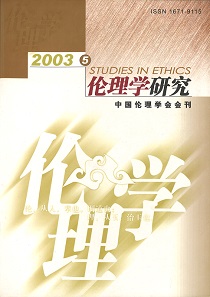|
|
On the Intrinsic Connection of Ethics and Hermeneutics
GONG Qun
2003(5):
11-18.
It is the value characteristic that actions of human beings aim at good. Human being can decide his nature by himself and, change his original nature into social nature, determines what kind of person and becomes what kind of person, and through such activities, to construct one world which has the meaning of morality, and to form hermeneutic horizonby moral and cultural cultivation and value activities. Meanwhile, the different and disagreeable understandings for the same thing in multicultural and multi-value worlds ask immediately the presentation of hermeneutics. Understandings ofhermeneutics need to come back to the common resources or common foundation ofall interpreters: prejudices, which have interpreter's horizon and interpreter'smoral ideas. For this reason, human being has both statuses : as an interpreterand as a moral being, and both are one thing. The intrinsic connection of ethics and hermeneutics lie essentially in their common possession of practical reason which embodies that it particularizes generalization in moral and hermeneuticpractices, in other words, to combine the universal knowledge and particular situations in their practices.
|



